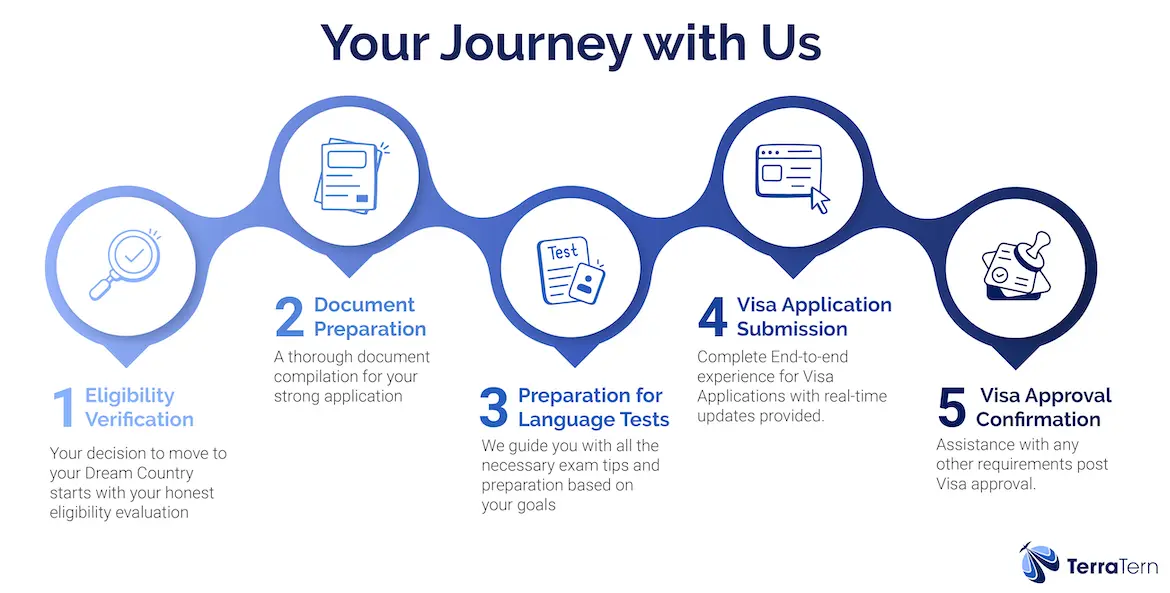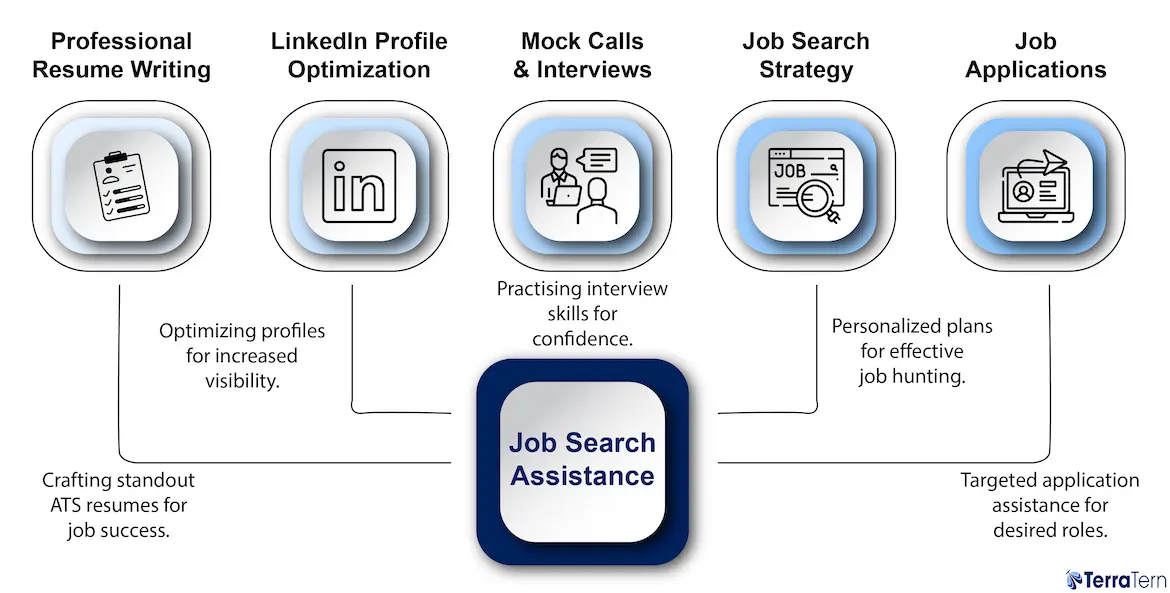Germany Opportunity Card Points Calculator
Why use Germany Opportunity Card?
-
Efficient Entry: Quick entry for jobseekers.
-
Transparent Evaluation: Point-based system assesses qualifications.
-
One-Year Permit: One-year residence permit for job search.
-
Broader Talent Pool: Wider range of qualified candidates for employers.
-
Qualifications Recognition: Eligibility with two years of experience.
-
Comprehensive Health Coverage: Free travel insurance and public health access.
-
Increased Job Opportunities: Access to 780,000 job vacancies.
What is the Germany Opportunity Card Calculator?
The Germany opportunity card calculator is a tool that is designed to help you assess eligibility for the opportunity card visa. The opportunity card visa has been recently launched by the German government for people seeking employment in Germany. Opportunity card visa replaced the job seeker visa in Germany. The opportunity card calculator evaluates applicants by awarding points for qualifications, language proficiency, professional experience, and other factors. This process is similar to skilled immigration systems in countries. This approach is a fair and transparent method for assessing potential immigrants.
Factors Assessed for the Eligibility of Germany Opportunity Card Calculator
The Germany opportunity card calculator assesses your eligibility for the card based on a point system. Here are the main factors that are evaluated:
1. Education: The education an applicant has received gets him some points. Higher educational qualifications, such as a university degree or higher, are supposed to increase points.
2. Age: Generally, younger applicants (under 35) receive higher points.
3. Language Skills: Your proficiency in German and English is important. Higher levels in either language (A2 German or C1 English) will get you more points.
4. Professional Experience: The more work experience you have, the higher your points.
5. Connection to Germany: Having a spouse or family member already living legally in Germany can give you additional points.
|
Criteria |
Maximum Points |
|
Qualification |
4 |
|
Age |
2 |
|
Language Skills |
3 |
|
Professional Experience |
3 |
|
Previous Stay in Germany |
1 |
|
Spouse Qualifying for Opportunity Card |
1 |
|
Total |
14 |
As per the opportunity card points calculator, at least 6 points out of 14 must be gained to be eligible for the opportunity card visa.
Opportunity Card Points Calculator
Here is a detailed breakdown of the opportunity card points calculator, outlining how points are awarded and distributed.
1. Partial Recognition of Qualification
|
Qualification |
Points |
|
You have applied for the qualification recognition and got partial recognition |
4 |
|
You have a qualification for a regulated profession, and you are required to participate in compensatory measures before obtaining a license to practice your profession |
4 |
2. Qualification from Bottleneck Occupations
|
Qualification relevancy |
Points |
|
If your formal qualification is from the Bottleneck occupations list |
1 |
3. Professional Experience
|
Work experience |
Points |
|
If you have professional work experience of 2 years in connection to your formal qualification (within the last 5 years) |
2 |
|
If you have professional work experience of 5 years in connection to your formal qualification (within the last 7 years) |
3 |
4. Age
|
Condition |
Points |
|
Under 35 |
2 |
|
Between 35 and 40 |
1 |
5. Language Proficiency
|
Language Skills |
Points |
|
German proficiency at CEFR A2 |
1 |
|
German proficiency at CEFR B1 |
2 |
|
German proficiency at CEFR B2 |
3 |
|
English proficiency at CEFR C1 or you are a native English speaker |
1 |
6. Potential of Spouses or Life Partners
|
Relation |
Points |
|
Your partner or spouse wants to come to Germany with you, and they also score 6 points for the opportunity card, so you get an extra point for eligibility. |
1 |
7. Previous stays in Germany
|
Previous Stays in German |
Points |
|
If you have stayed in a continuous period of 6 months in the last five years in Germany, you can be awarded an extra point. The stays can be for work or study purposes. Tourism or meeting family purposes do not qualify for this eligibility. |
1 |
What is Partial Recognition of Qualification in Germany Opportunity Card Calculator?
When your qualification gets "partial recognition" for the German Opportunity Card, it means that your education or professional training from another country has been evaluated. Still, it's not exactly the same as a German qualification. This might be because your education or experience only partially matches what's required in Germany for your field.
The good news is that even with partial recognition, you still earn points. Specifically, you get four points for having partial recognition. This can help you reach the total of six points needed to get the Opportunity Card.
What Are Bottleneck Occupations in Germany Opportunity Card Calculator?
"Bottleneck occupations" or "shortage occupations" are jobs in high demand in Germany because there aren't enough qualified workers to fill them. If you have a qualification in one of these jobs, it can help you when applying for the Germany Opportunity Card.
Here's how it helps:
1. Extra Points: Qualifying for a bottleneck occupation can give you extra points in the Opportunity Card system, increasing your overall score and making you a stronger candidate.
2. Lower Salary Requirement: The minimum salary you need to earn to get a work visa after finding a job in Germany might be lower for some of these in-demand jobs. This can make it easier to get a job and eventually convert your Opportunity Card into a permanent residence permit.
Germany's "Bottleneck Occupation" list includes five main sectors divided into ten groups:
-
Information and communications technology professionals
-
Teaching professionals
-
Health occupations
-
Science and engineering professionals
-
Managerial occupations
Opportunity Card Points Calculator Bottleneck Occupations
1. Group 250 - Information and Communications Technology Professionals
|
Groups |
Professions |
|
251. Software and applications developers and analysts |
|
|
252. Database and network professionals |
|
2. Group 23 – Teaching Professionals
|
Groups |
Professions |
|
231. University and higher education teachers |
2310 University and higher education teachers |
|
232. Vocational education teachers |
2320 Vocational education teachers |
|
233. Secondary education teachers |
2330 Secondary education teachers |
|
234. Primary school and early childhood teachers |
2341 Primary school teachers 2342 Early childhood educators |
|
235. Other teaching professionals |
|
3. Groups 221, 222, 225,226 – Health Occupations
|
Groups |
Professions |
|
221. Medical doctors |
2211 Generalist medical practitioners 2212 Specialist medical practitioners |
|
222. Nursing and midwifery professionals |
2221 Nursing professionals 2222 Midwifery professionals |
|
225. Veterinarians |
2250 Veterinarians |
|
226. Other health professionals |
|
4. Group 21 – Science and Engineering Professionals
|
Groups |
Professions |
|
211. Physical and earth science professionals |
|
|
212. Mathematicians, Actuaries and Statisticians |
2120 Mathematicians, Actuaries and Statisticians |
|
213. Life Science Professionals |
2120 Mathematicians, Actuaries, and Statisticians |
|
214.Engineering Professionals (excluding Electrotechnology) |
|
|
215. Electrotechnology Engineers |
|
|
216. Architects, Planners, Surveyors and Designers |
|
5. Groups 132, 133, 134 – Managerial Occupations
|
Groups |
Professions |
|
132. Manufacturing, Mining, Construction, and Distribution Managers |
|
|
133. Information and Communications Technology Service Managers |
1330 Information and Communications Technology Service Managers |
|
134. Professional Services Managers |
|
How to Improve Germany Opportunity Card Calculator Score?
Here are some tips to improve your score on the Germany Opportunity Card points Calculator:
1. Enhance Your Qualifications: Completing vocational training or earning a higher education degree recognized in Germany can significantly boost your score. If you need German qualifications, relevant work experience can help you make up for it.
2. Expand Your Work Experience: Try to gain as much professional experience in your field as possible. If you have five years of experience in the last seven years, you'll get the maximum points (3). Even two years of experience can earn you 2 points.
3. Improve Your Language Skills: Learning German can really pay off. Good German skills will get you 3 points. If you don't reach that level, even sufficient German skills or English proficiency at the C1 level can give you 1 point each.
4. Optimize Your Age: Age can also impact your score. If you're under 35, you’ll get 3 points. If you’re between 36 and 39, you’ll still earn 1 point.

Discover All That Terratern Can Do for You
- Clear and Honest Guidance and Consultation
- Comprehensive Visa and Immigration Documentation Assistance
- Tailored Checklists Aligned with Your Program Requirements
- Job Search Assistance and Support
- Preparation for Language Proficiency Tests such as IELTS, PTE, and more
- Continued Support and Relocation Assistance After Arrival
Unlocking Your Career Potential: TerraTern's Comprehensive Job Search Assistance
TerraTern offers a holistic job search assistance service designed to empower job seekers at every stage of their career journey. From crafting standout resumes to mastering interview skills, their comprehensive approach aims to maximize your chances of landing your dream job in today's competitive market.
Key features of TerraTern's Job Search Assistance:

- Professional Resume Writing: Crafting standout ATS resumes for job success
- LinkedIn Profile Optimization: Enhancing profiles for increased visibility
- Mock Calls & Interviews: Practicing interview skills to boost confidence
- Job Search Strategy: Developing personalized plans for effective job hunting
- Job Applications: Providing targeted application assistance for desired roles
TerraTern's service covers all crucial aspects of the job search process, ensuring that candidates are well-prepared and positioned for success in their career pursuits.
Conclusion
The Germany Opportunity Card Calculator evaluates eligibility for the new opportunity card visa, replacing the job seeker visa. It evaluates education, age, language skills, experience, and German connections. Applicants need at least 6 of 14 points. This transparent system helps skilled individuals measure their visa potential and prepare to enhance their chances of success.
